- Home
- Keith R. A. DeCandido
The Zoo Job Page 3
The Zoo Job Read online
Page 3
Several thoughts went through Arthur’s head at once. Only he, A.J., and Fred had access to the server room. Fred was up here in his office—he looked over to be sure, and there he was on the phone, probably with Jenna explaining the facts of life to her—and he’d just seen A.J. in his.
The server room had an ID scanner. Arthur’s hand went down to the ID clipped to his pants.
Except it wasn’t. He felt nothing, and looking down, he saw nothing. His ID was gone.
Somebody had stolen it and used it to get into the room. The one room in the entire world where one could see all of AA’s accounting records.
And the tech support guy was unaccounted for.
“Call McGann, tell him to get his southern ass to the server room.”
“Yes, Mr. Andrechuk.” Yvonne nodded while Arthur rang for the elevator, which took him back down to seven.
He passed A.J.’s office, where the two IRS people were hunched over one of the stations while A.J. watched. There was a small netbook set up next to the workstation, which Baker typed on occasionally. Still no sign of the tech support guy.
“Excuse me,” he said softly, not wanting to give the IRS people anything to be suspicious of, “but I need to borrow Mr. Kiroda for a second. A.J.?”
As soon as A.J. cleared the doorway, Arthur grabbed his arm even harder than he’d grabbed Fred’s.
“Ow! Artie, what’s—”
“Someone broke into the server room.”
“That’s impossible.”
“They stole my ID.”
“How?”
Arthur blinked and stopped walking. “I don’t know.” He shook his head and continued moving. “Doesn’t matter, they’re in there now, and we have to—”
They arrived at the door, which was closed—but the green light on the ID scanner was still on, which didn’t make sense. When the door closed all the way, the light went back to red until another approved ID was scanned.
Arthur peered more closely at the door—and saw a piece of cardboard wedged between the doorframe and the door, right where the latch was. Which meant the door had never registered as closed.
He yanked the door open, which proved his point—but nobody was there.
A.J. immediately went over to the workstation. It was a stand-up station with an adjustable keyboard. A.J. had to lever it downward so he could work comfortably, then started tapping on the keyboard.
“Looks like we’re good. I’m not seeing any sign that anyone’s used this puppy since I was in here yesterday.”
That didn’t make any sense. Why would someone steal his ID and then go into this room just to—
Then it hit him. “Yes someone did. The keyboard was adjusted to someone taller than you.”
A.J. held up both hands, palms up. “I’m telling you, Artie, there’s no sign that anyone tried to—”
“How can there be no sign, dumb-ass? He obviously used it! Even if he tried to get in and hit a firewall, wouldn’t there be a sign of that?”
“Well, sure, but—”
“If he broke in here to play Minesweeper, you’d see it. So if you didn’t, it means we had a pro in here who covered his tracks. Dammit!” He pointed at the workstation. “Figure it out, A.J., or it’s more than just your ass.”
He walked out, pushing the door open, and this time removing the cardboard. A.J. had his ID and could get out that way, and he didn’t want anyone else wandering in.
Smith then stuck her brunette head out of A.J.’s office. “Mr. Andrechuk, may we see you a minute, please?”
“I’m sorry, Ms. Smith, really, but we’ve got a major security breach here, and I need to deal with it.” Even as Arthur said that, he wondered where the hell McGann was. He’d told Yvonne to get him to the server room.
“Mr. Andrechuk, you have much big—”
Holding up a finger with one hand, Arthur retrieved his cell phone with the other and called the front desk. “Just one second.”
Smith put her hands on her hips. “You don’t have a second, Mr. Andrechuk, you—”
Arthur ignored her as the security desk went to voice mail. “Seriously?” He hit end, then called his assistant. “Yvonne, where the hell is McGann?”
“He said he was reporting right to you.”
“Well, he’s not here now, and I need—”
“Mr. Andrechuk!”
This Smith woman was getting on Arthur’s nerves. “What!?”
“I need you to come in here and explain why we’re reading your company’s entire pension fund at one hundred and forty-nine dollars and seventy-two cents.”
Arthur opened his mouth, then closed it. He’d told Rosa that he was ready for anything the IRS would find—but he never expected them to find the real amount in the pension fund.
“I also need you to explain this audio file that we were just e-mailed.”
“Um—”
She motioned with a finger for him to come in, and then entered A.J.’s office.
Reluctantly, Arthur followed, if for no other reason than curiosity as to what that audio file was.
Looking at Baker, Smith said, “Play it.”
Baker nodded and tapped his netbook’s track pad.
Arthur then heard his own voice: “The whole point of the exercise, Rosa, is to siphon money off from the pensions in such a way that the IRS won’t notice. It’s probably just some random audit. Don’t worry about it. In fact, this helps us. If the SEC looks into us and sees a clean bill of health from the IRS, we’ll be golden. They won’t expect anything.” There was a pause, then: “Rosa, I’ve paid you good money to keep certifying that the pension funds are okay, money that I know you’ve already spent because Pedro is still getting—”
There was likely more to the recording, but Arthur didn’t hear it because he was too busy running.
Not bothering with the elevator, he ran up the stairs to the top floor. His heart pounded like a trip-hammer, and not just from the exertion. Somehow, someway, A.J.’s programming had been messed up. He was so close . . .
By the time he reached ten, he was winded, and swore that he would, dammit, start using his gym membership.
When he burst onto the thirteenth floor, he stumbled toward his office, trying to catch his breath.
Yvonne rose, and Fred came running out of his own office.
“Mr. Andrechuk?”
“Artie, what happened?”
The elevator dinged open and Arthur turned in a panic, fearing it would be the IRS people.
But no, it was McGann. “Oh, thank Christ. Listen, McGann, I need you to get me out of here now. Yvonne, call A.J., tell him to wipe everything before—”
His next words were cut off by McGann’s forearm slamming into his throat.
Arthur fell to the floor, his vision swimming from his head striking the tile. Arthur had always hated carpeting, and refused to put any on the thirteenth floor, a decision he was hazily regretting as spots danced before his eyes.
Vaguely, he heard McGann say, “’Bout time I got to hit him. Nate, I got him.”
He also heard Fred say, “Looks like Jenna can pick up her kid after all . . .”
AN HOUR AGO
Nate Ford’s voice sounded in Alec Hardison’s ear. “All set, Hardison?”
Hardison was sitting in the rear compartment of Lucille, going over his code one last time. “Just doing a final check. Then all I have to do is show up to do tech support, put in the jump drive, and the program does the rest.”
His incredibly brilliant program would piggyback onto the one Kiroda was using to siphon off AA’s pension funds into Andrechuk’s account. Only now, it would be siphoned off into one of Hardison’s accounts. “The money’ll be in my account by end-of-business, and then we’ll be able to pay back all of AA’s employees
who don’t even know they’ve been robbed yet.” Hardison frowned. “That’s not right.”
“What isn’t right?” Nate asked.
“They ain’t been robbed. When you get robbed, somebody’s standin’ in front of you takin’ your money.”
“Yes, Hardison,” Nate said patiently, “that’s why we’re thieves and not robbers.”
“Yeah, but what do we call what’s happenin’ to these people? I mean, if they were victims of a robbery, they were robbed, but they’re victims of a theft, so they were—what? Thefted?”
“Dammit, Hardison!” That, of course, was Eliot Spencer. “Will you shut up about verbs and get in here? I just had to listen to Andrechuk go on about ‘Beantown.’ Again. If we don’t end this soon, I’m gonna have to hit him. He just got on the elevator.”
Nate said, “Parker, go.”
Hardison leaned forward and read over the last of the code. From Parker’s comms, he heard the telltale ding of an elevator opening. That had to be her getting on the elevator on the second floor. With a knowing smile, he imagined the scene: Parker walking onto the elevator without making eye contact with Andrechuk, lifting the CEO’s ID, without him noticing, and then getting off at ten. Just like they’d planned it. His girl knew her stuff.
Once Hardison was done checking his code—it was almost perfect, he just modified one line that would make things run more efficiently—he leaned back, stretching his arms and cracking his neck.
Then he noticed that the bug that Eliot had placed on Andrechuk’s office phone went online.
As he listened to Andrechuk’s conversation with his confederate, Hardison felt the blood drain from his face. “Nate, we got us a big problem. The IRS is coming.”
“That’s tomorrow, Hardison. Sophie and I will—”
“No, Nate, the real IRS. Andrechuk just got a heads-up from his pet CPA that two auditors are showing up.” He alt-tabbed to another window and hacked into the IRS mainframe, doing a search on the two names that Rosa Menendez had mentioned. Sure enough: “I got a Simone J. Smith and a Thomas Allan Baker scheduled to do a random audit of AA this morning.”
“They’re already here,” Eliot said. “I just passed them through security.”
Knowing full well that Nate would not listen to his advice, Hardison said, “We gotta abort. I can’t do this with the IRS breathing down—”
“No, we just change the plan,” Nate interrupted, saying exactly what Hardison knew he would say.
“Plan K, right? That’s the one where you kiss all the other plans good-bye?”
“No, the plan’s actually more or less the same, the only difference is what you do once you’re in the server room. Instead of a program that reroutes the pension money, I want you to get rid of what Kiroda did to hide it.”
At times, Hardison hated discussions over comms, because he really wanted to look Nate in the eye when he told him to go perform an anatomical impossibility upon himself. “Nate, I just spent the better part of a day writing this very elegant, very sophisticated program, and now you’re telling me to trash it to—”
“Yes, Hardison, and do something that doesn’t need to be elegant or complicated. Just strip away Kiroda’s fakery.”
“‘Just’? Really? You people ha—”
Eliot jumped in. “Hardison, I swear, if you start the ‘you people have no idea what I do’ speech . . .”
“All right, all right.” Hardison sighed. He went over to his netbook, composed an e-mail to the two IRS auditors, whose addresses he’d gotten off the mainframe he’d hacked, and set it to send in twenty minutes. “I’m goin’ in.”
Hardison went in, got the Trademark Eliot Spencer Scowl (patent pending) from “McGann” at the security desk, and then met up with A.J. Kiroda.
It was almost a shame to trash this guy’s program. Kiroda was good. Not as good as Hardison, of course, but maybe almost as good as Ka0s. The AA computer maven had done a beautiful job of creating a computerized illusion, cloaking reality in a dazzle of false information that would fool all but the most skilled of programmers. Unfortunately for him, Hardison was the most skilled of programmers.
In another life, Hardison might have called him “friend.”
But Kiroda was helping the mark screw people out of their retirement money. What was worse, Hardison hadn’t been able to find any sign that Kiroda had been paid extra for this; he was just doing what his boss told him to do, even though it screwed his fellow employees. At least Menendez had been doing it to help get meds her husband needed.
Once Hardison sat down to “fix the e-mail problem,” Kiroda left him alone. Parker met Hardison at the server room door. She used Andrechuk’s ID to get him in, then shoved a piece of cardboard in the doorjamb.
After readjusting the keyboard—Kiroda was very short—Hardison went in and did just as Nate asked, stripping out all the code that Kiroda used to mask his boss skimming from the pension fund. Parker then dragged him through an air vent to the outside.
He stood and coughed for several seconds once they were out. “Them things is dusty! I got allergies, and I need—need—” He coughed some more.
Parker slammed him on the back a little too hard, and Hardison stumbled forward. He looked up at her and said, “Really?”
Then he heard a very loud thump over the comms, followed by Eliot saying, “’Bout time I got to hit him. Nate, I got him.”
“Good,” Nate said. “Leave him for the IRS and the feds.”
“How’d the feds get here so fast?”
“Someone called them,” Nate said in his smug voice.
Hardison really hated Nate’s smug voice. He bent over, hands on knees, coughing some more, making sure his back was angled so Parker couldn’t hit him again.
Eliot met up with them outside. “C’mon, let’s go.”
Holding up a finger, Hardison said, “Hang on. Dust—allergies—”
“Fine, then I’m drivin’.”
Hardison pulled himself upright. “Oh, hell no. You are not driving Lucille!”
TWO
Every time Nate Ford entered John McRory’s Pub, he expected it to be larger.
That was, of course, a consequence of his spending so much time in this bar as a youth. He was Jimmy Ford’s son, and this bar was Jimmy Ford’s office. His father’s idea of day care was to sit young Nate down at the bar and show him how to play three-card monte.
When Nate grew up, he went to a seminary in California, as far away from Jimmy as possible both geographically and ethically. The seminary didn’t take, but California did. He made Los Angeles his home for years, traveling extensively for his job at the insurance firm of IYS—though he didn’t return to Boston until after his father had been incarcerated.
Now he’d made McRory’s his own. As a teenager, he thumbed his nose at Jimmy Ford by moving three thousand miles away and studying to be a priest. As an adult, he continued to thumb his nose in other ways.
The bar hadn’t really changed all that much since the days in the early part of the twentieth century when it catered to Irish immigrants: furnished in polished wood, with a selection of booze that tended toward the beers and Scotches and whiskeys. It catered to a neighborhood crowd, mostly white—at present. Alec Hardison was the only person of color in the place, sitting at the bar with Parker—they liked to enjoy each other’s company: hence only one television, instead of multiple TVs tuned to NESN and all the ESPN stations.
Hardison owned the building above it, where Nate’s apartment was located, and it and the bar combined to become the unofficial headquarters for their operation. The jobs often began and ended in the place, and Nate was, at the moment, handling the final stages of their latest. Jenna Stannis, the client, was sitting at one of the booths when he came in from the back. She was nursing an amber beer.
In direct contr
ast to the nervous grimace she was wearing when she came to McRory’s two weeks ago, Jenna now met him with a relaxed smile. “Mr. Ford, I don’t know how you did what you did, but thank you. There was a part of me that still didn’t entirely believe that Arthur was ripping us all off, so when the IRS shut the place down and the FBI arrested him . . .” She shook her head and took a long gulp of her beer. “Oh, that feels good. Honestly, I’ve been afraid to drink, y’know?”
Nate did not particularly understand this feeling, but said nothing as he sat down.
Jenna went on: “I really didn’t think anybody would be able to get through A.J.’s program. My only regret is that I didn’t see your guy take Arthur down. I’m just glad I got to see him led away in handcuffs.”
Smiling, Nate said, “It was our pleasure, Jenna. It’s gonna take a while for the SEC and the IRS and the FBI to plow through everything, but Arthur Andrechuk is definitely going down—and your pensions should all be restored.” He reached into his jacket’s inner pocket and pulled out an envelope. “But just in case—this is for you. It’s the entirety of your pension to date. I know it’s not the best time to be unemployed, so this should keep you going until you find another job.”
The nervous grimace came back. “Mr. Ford, I—I can’t take this!”
“Sure you can.”
But even as he spoke, he noticed another person with a nervous grimace: a short, blond-haired woman who had just entered the bar and ordered a single-malt Scotch from Cora behind the bar. She was looking nervously around the bar, as if trying to find someone—and then her eyes fell on Nate and she quickly looked away.
Nate suspected that their newest client had just walked in the door. Especially since she matched the description in Zoë Kerrigan’s e-mail of the previous day.
By the time he finished with Jenna, who left the bar with her relaxed smile even bigger than it had been when he handed her the pension money, the new client had ordered a second Scotch. Nate came over and sat down next to her and said without preamble, “You must be Marney Brillinger.”
The woman almost choked on her Scotch. “How’d you—”

 Alien
Alien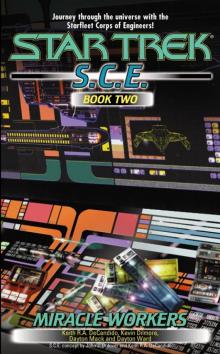 Miracle Workers
Miracle Workers Articles of the Federation
Articles of the Federation Supernatural Heart of the Dragon
Supernatural Heart of the Dragon War Stories: Book Two
War Stories: Book Two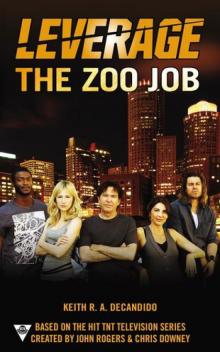 The Zoo Job
The Zoo Job Under the Crimson Sun
Under the Crimson Sun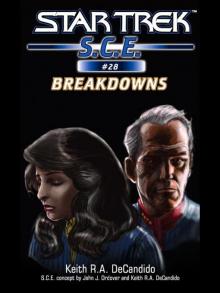 Breakdowns
Breakdowns Mermaid Precinct (ARC)
Mermaid Precinct (ARC) Supernatural 1 - Nevermore
Supernatural 1 - Nevermore STAR TREK - The Brave and the Bold Book One
STAR TREK - The Brave and the Bold Book One Four Walls
Four Walls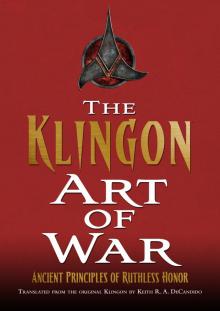 The Klingon Art of War
The Klingon Art of War Blackout
Blackout War Stories: Book One
War Stories: Book One The Brave and the Bold Book Two
The Brave and the Bold Book Two Honor Bound
Honor Bound Sleepy Hollow: Children of the Revolution
Sleepy Hollow: Children of the Revolution Worlds of Star Trek Deep Space Nine® Volume Three
Worlds of Star Trek Deep Space Nine® Volume Three Star Trek: TNG: Enterprises of Great Pitch and Moment
Star Trek: TNG: Enterprises of Great Pitch and Moment Genesis
Genesis Demons of Air and Darkness
Demons of Air and Darkness Star Trek - TNG - 61 - Diplomatic Implausibility
Star Trek - TNG - 61 - Diplomatic Implausibility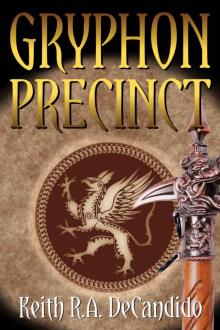 Gryphon Precinct (Dragon Precinct)
Gryphon Precinct (Dragon Precinct)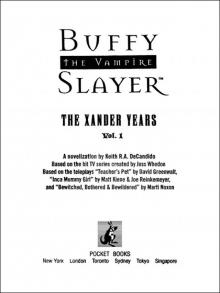 THE XANDER YEARS, Vol. 1
THE XANDER YEARS, Vol. 1 Nevermore
Nevermore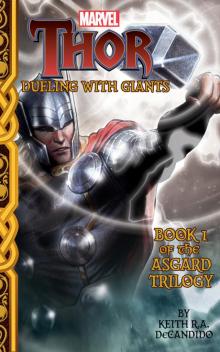 Thor
Thor The Brave And The Bold Book One
The Brave And The Bold Book One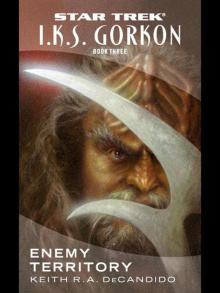 I.K.S. Gorkon Book Three
I.K.S. Gorkon Book Three STARGATE SG-1: Kali's Wrath (SG1-28)
STARGATE SG-1: Kali's Wrath (SG1-28) Bone Key
Bone Key Guilt in Innocece
Guilt in Innocece Star Trek - DS9 Relaunch 04 - Gateways - 4 of 7 - Demons Of Air And Darkness
Star Trek - DS9 Relaunch 04 - Gateways - 4 of 7 - Demons Of Air And Darkness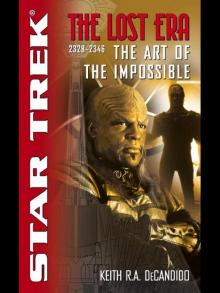 The Art of the Impossible
The Art of the Impossible I.K.S. Gorkon Book One: A Good Day to Die
I.K.S. Gorkon Book One: A Good Day to Die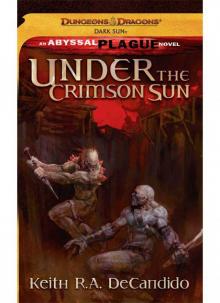 Under the Crimson Sun (the abyssal plague)
Under the Crimson Sun (the abyssal plague) DIPLOMATIC IMPLAUSIBILITY
DIPLOMATIC IMPLAUSIBILITY Tales from the Captain's Table
Tales from the Captain's Table A Burning House
A Burning House Cycle of Hatred (world of warcraft)
Cycle of Hatred (world of warcraft)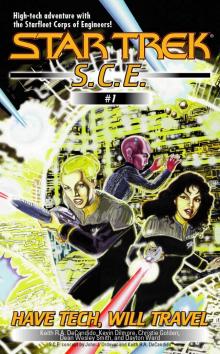 Have Tech, Will Travel
Have Tech, Will Travel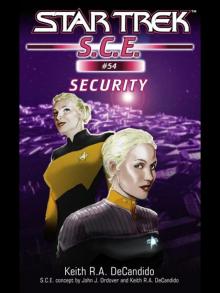 Security
Security